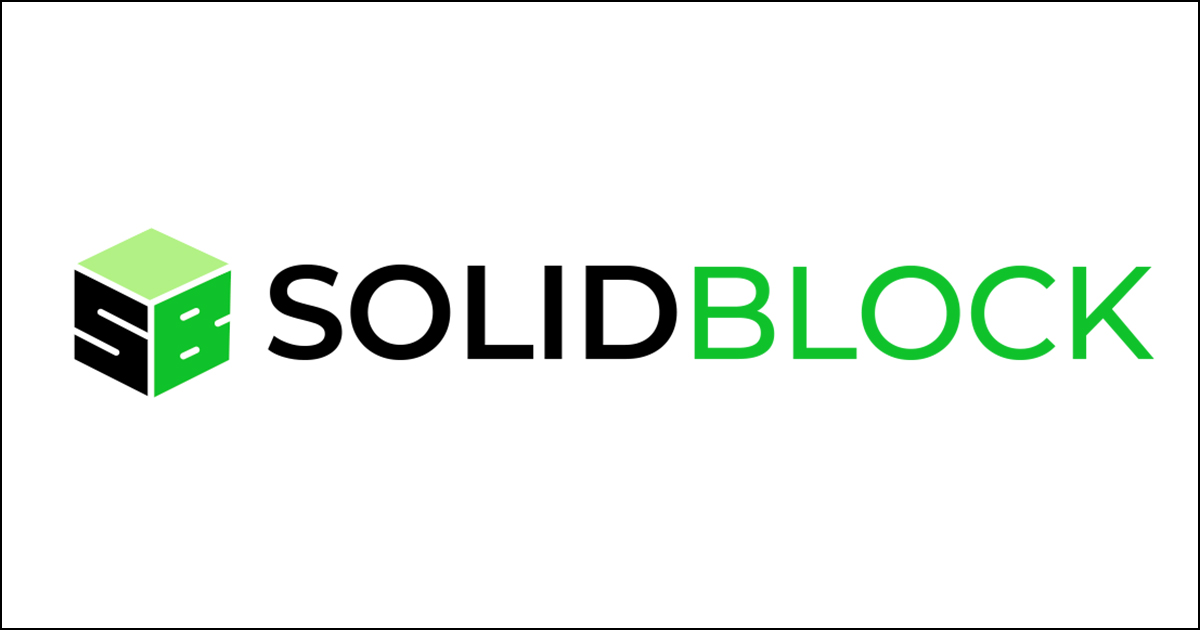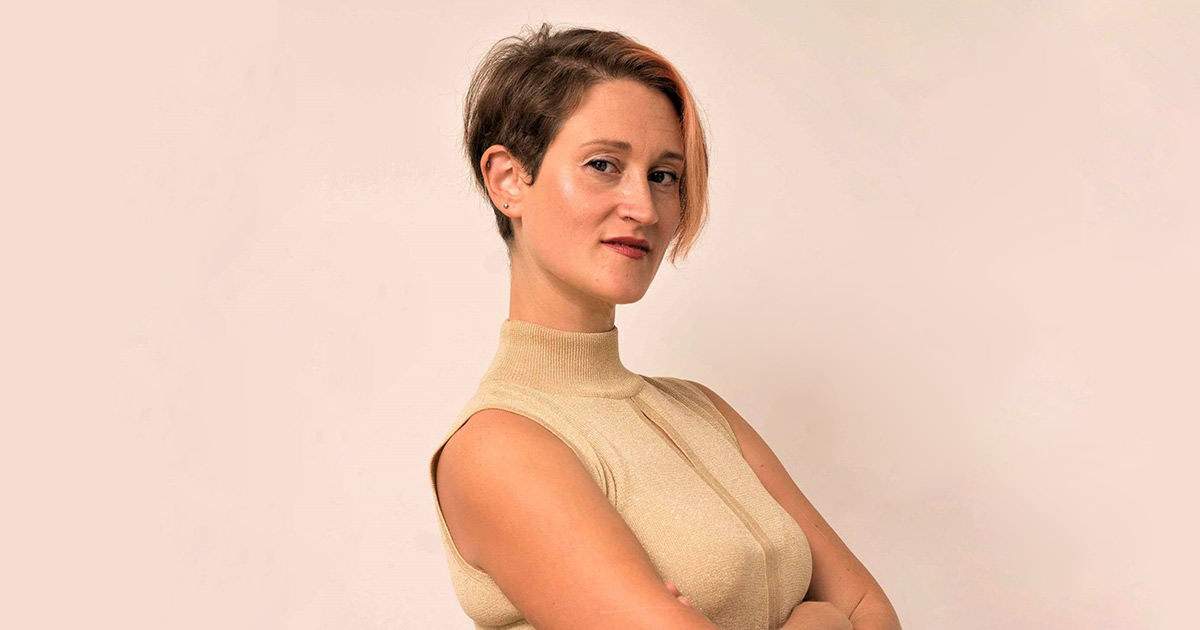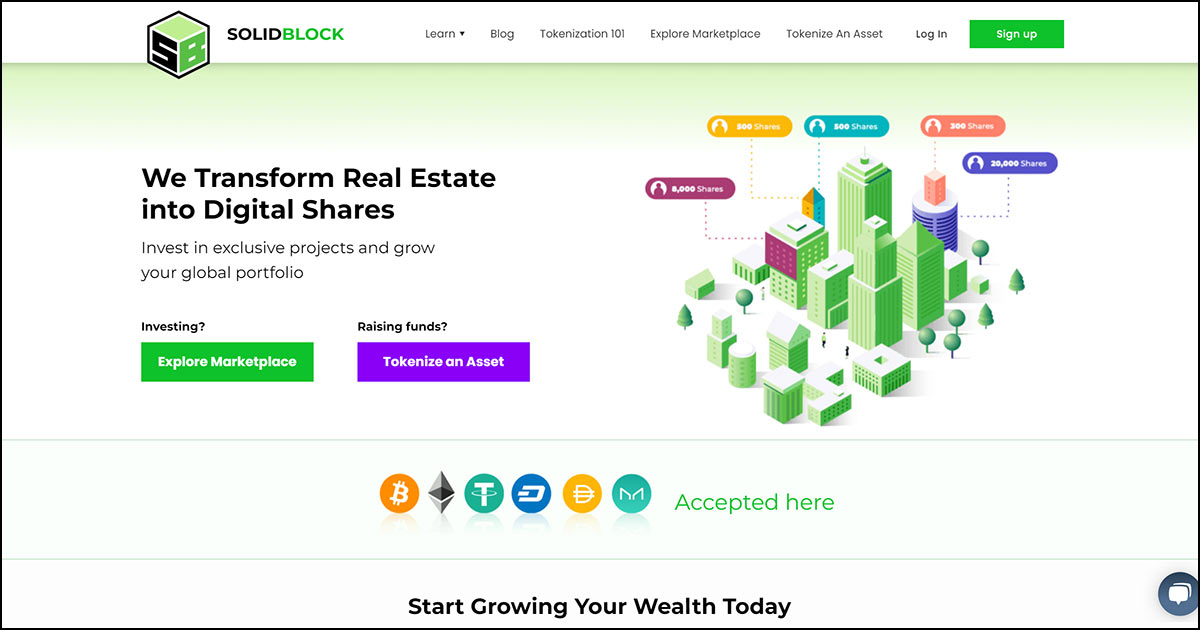SolidBlock Profile

Last Updated: By TRUiC Team
SolidBlock is a real estate tech startup that offers consumers a platform for transforming assets into tradable financial products using blockchain technology.
Interview With Yael Tamar
Describe your product or service:
“Our product is a digital securities issuance and trading platform. SolidBlock is focused on transforming real estate and other illiquid assets into a tradable financial product by using blockchain to establish the asset's financial history, increase its liquidity, and ensure optimal growth of the base asset via its data-driven platform.”
Describe your company values and mission:
“Our mission is to make real estate accessible to everyone by creating a market that is global, inclusive, transparent, and efficient, with no borders, limits, or unnecessary complexities and where capital is both accessible and protected. Yael’s personal mission is to raise awareness about the hurdles to blockchain adoption and inspire companies to work on various technologies or platforms that will assist enterprises with implementing blockchain in their workflow.”
How are you funded? I.e. type of funding, number of funding rounds, total funding amount.
“SolidBlock has just completed an initial [round of seed funding] led by the legendary American venture capitalist Tim Draper’s fund, Draper Associates. Another valuable investor is Asahi Kasei Ventures, the venture capital arm of a leading home builder in Japan, which is part of Asahi Kasei Corporation, a multinational Japanese chemical company. And from Gaingels, the world's most active venture syndicate investing in companies that embrace LGBT leadership, diversity, equality, and inclusion.”
How did you come up with and validate your startup idea? Tell us the story!
“We are passionate about bringing real estate opportunities to people around the world, using blockchain technology, enabling easier access, trading, and transparency, with the goal of making real estate work for everyone. We care because we are also everyone!”
How did you come up with your startup's name? Did you have other names you considered?
“SolidBlock is a play on words that co-founder Yuval Wirzberger and myself thought captured the essence of our vision of transforming illiquid assets such as real estate into tradable, compliant liquid assets. The technology is based on blockchain, and our primary, initial focus is on real estate, a ‘solid’ real-world asset. The word ‘block’ has a dual role — emphasizing blockchain and the blocks that build houses.”
Did you always want to start your own business? What made you want to become an entrepreneur?
“I was born in Crimea on the shores of the Black Sea. Essentially, I grew up on the sea and on the beach surfing, swimming, and diving. I am sure that those earliest years fostered my passion for freedom and entrepreneurship. For high school, I travelled by myself to the US on a special program and subsequently earned my BA from Hunter College and an MA in Behavioral Finance from the City University of New York. For all practical purposes, I was independent from a very young age and always knew that my life’s journey would be at the forefront of social and economic evolution. I worked on the New York and Tel Aviv stock exchanges but my pace and passions were clearly more fit for the startup world.
In 2018, Yuval Wirzberger and I founded SolidBlock. Yuval and I are the base of a fantastic team. He has over 15 years of technology and product management experience and has helped both startups and large enterprises bring new media and technical visions to life. I have over a decade of experience as a marketing executive within the fintech, finance, telecom, and energy industries, as well as a long track record as an entrepreneur. I am also a regional co-chair at FIBREE, the Foundation for International Blockchain and Real Estate Expertise, the leading international network for exchanging knowledge between the real estate industry.
I am also a mother to two kids, ages six and eight, not to mention the dog and cat.”
Feeling inspired? Learn how to launch your company with our guide on how to start a startup.
Did you encounter any roadblocks when launching your startup? If so, what were they and what did you do to solve them?
“We see two major challenges. The first is that SolidBlock is not content to just tokenize real estate like some of our competitors. We see ourselves as a bridge to a decentralized financial system that will make real estate investment accessible to all, small and big investors, those who are accredited and those who are not. The second is that while tokenization is the new buzzword, our mission to democratize real estate must include our ability to educate the public about the benefits of tokenization. In order to relay the added value of tokenization to our prospective clients, we have had to devise a lot of educational materials, which we have done consistently and successfully. We have prepared a course on tokenization, built a prolific blog, webinars, a podcast channel, as well as contributed to a handbook on how to tokenize which is now available for downloading on our website.”
What's your marketing strategy?
“Go-to-market strategy:
Partnerships with large real estate sponsors or asset managers, such as family offices, investment firms, etc. Working with channel partners [that] sell SaaS solutions to our target market, such as software packages for accounting, invoicing, managing funds, or assets for real estate.
On the investor side, partnering with investor networks and angel groups.”
How did you acquire your first 100 customers?
“Now that our marketplace is up with several international projects, we are looking to onboard more asset owners and, at the same time, create a community of investors. This will take time.”
What are the key customer metrics / unit economics / KPIs you pay attention to to monitor the health of your business?
“We, at SolidBlock, are working to democratize real estate investment. Banks and other traditional lending institutions have made it harder than ever for young buyers to own property. Without viable alternatives, millennials have been scared off of the dream of property ownership. Some see this slump as a death spiral leading to recession within the next very few years.
By bringing the process of acquiring capital in line with property owners’ needs and expectations, tokenization can reverse these downward trends. It will change the way asset owners raise capital, opening up real estate investment beyond the heavy iron gates of major financial institutions.
Regulation remains a challenge, but things are indeed shifting. Nothing is final yet, and it remains to be seen how the definitions will eventually shake out. But given that things couldn’t possibly get more restrictive, any progress will be great news for tokenization.
Opening up these definitions will go a long way toward bringing tokenized real estate investment into the mainstream. And beyond that, this move will also help the US reclaim its rightful place as a world leader, embracing positive change and democratization of investment to benefit all its citizens.”
What's your favorite startup book and podcast?
“I am constantly reading. My current favorite book is Tim Draper’s ‘How to be The Startup Hero: A Guide and Textbook for Entrepreneurs and Aspiring Entrepreneurs.’"
What is a song or artist that you listen to for motivation?
“Tim Ferriss. His philosophy, his life and career paths, his podcasts, and his books, particularly ‘The 4-Hour Workweek’ definitely influenced the way I try to run my business and live my life. I do admit that I have a bit to go to reach his ideal, but that’s okay …. I guess that’s what makes him a perfect role model.”
Is there a tool, app, or resource that you swear by to help run your startup?
“ClickUp, Toggle, Hubspot.”
What is something that surprised you about entrepreneurship?
“My mothering skills have come in very handy in running a startup!”
How do you achieve work/life balance as a founder?
“There has been a prevailing view that women can have it all — a family and a career and all that these two seemingly contradictory life-defining spheres give us. I am a mother to two children, ages six and eight (not to mention the dog and the cat that we own). I am also a more than full-time Co-CEO of a startup business. That means that trade-offs happen. We compromise when it comes to finding that balance between love and success. And that balance will be different for each woman standing on that complex scale.
My favorite part of my entrepreneurial journey is definitely the blessing of being able to see a dream become reality. In other words, I am able to take an idea, grow it, develop it, nurture it, and watch it flourish. When I think about it, entrepreneurship is a lot like parenthood. For me, fintech in particular and startups in general may be optimal career choices for women. More than convincing women that they have the requisite skills to become startup founders, it is conditioning the society in which we live that a woman’s choice to enter the business world should be supported.”
What is a strategy you use to stay productive and focused?
“The most important thing for me as an entrepreneur is to be able to see the “big picture.” So there are several things I do daily to enable that, which include waking up early (really early), planning my day, and critically assessing my performance over the past days or the week.
In order to be able to focus, I try to meditate daily; however, recently, with all of the stress surrounding having children at home during the COVID-19 pandemic, I haven’t been able to practice it consistently, and I think it has affected my performance.”
Did you have to develop any habits that helped lead you to success? If so, what are they?
- “Building the best possible team, which is the foundation of my success and helps me become the best version of myself.
- Cultivating an absolute belief in myself (thanks, Deepak Chopra!).
- Waking up early — miracle morning, the 5 a.m. (occasional 6 a.m.) club.
- Eisenhower box for tax prioritization.
- Eating frog first thing in the morning — do most difficult things first to avoid procrastination.
- Reading! Includes [audiobooks].
- Drawing examples from other highly successful people's habits.
- Always Being World Class (thanks, Debbie Neal!).
- Being the most hardworking person I know (10x, thanks, Grant Cardone).
- Integrity in everything and absolute honesty with myself and others.”
What was your first job and what did it teach you?
“I’d go back to a childhood memory. I remember how one day I went to buy ice cream with bills that had far too many zeros on them and the next day they had even more! I realized with shock that this paper money was worthless. The combination of experiencing first hand a rigid centralized financial system in Ukraine and then moving to the US as a 16-year-old to participate as a high school exchange student in Kershaw, South Carolina, propelled me towards the study of finance.”
Recommended:
- Keep up with more startup companies by visiting our list of the top startups to watch.
- Hear startup stories from real founders on the Startup Savants podcast.
- Form your own startup by reading our review of the best online incorporation services.
Tell Us Your Startup Story
Are you a startup founder and want to share your entrepreneurial journey withh our readers? Click below to contact us today!
More on SolidBlock

Founder of Real Estate Startup SolidBlock Shares Their Top Insights
Yael Tamar, founder of real estate startup SolidBlock, shared valuable insights during our interview that will inspire and motivate aspiring entrepreneurs.

Ways to Support Real Estate Tech Startup SolidBlock
We asked Yael Tamar, founder of SolidBlock, to share the most impactful ways to support their startup, and this is what they had to say.


